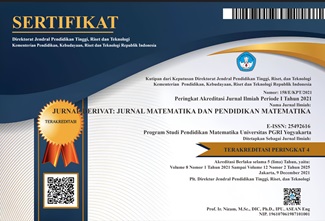Analisis Kemampuan Literasi Matematis Siswa Ditinjau Dari Karakter Kemandirian Belajar Materi Aljabar
DOI:
https://doi.org/10.31316/j.derivat.v7i2.1057Abstract
This study aims to: 1) describe students' mathematical literacy skills in algebraic material in terms of learning independence. 2) to describe the factors that affect students' mathematical literacy skills in algebraic material in terms of learning independence. This research method is qualitative. The subjects in this study were students of class VIII-A at SMP Negeri 1 Singkawang. The data collection instruments used a learning independence questionnaire, a mathematical literacy test, and an interview sheet. Data analysis techniques used the Miles and Huberman Model, namely, data reduction, data presentation, and drawing conclusions. The results showed that 1) The students' mathematical literacy ability in terms of their high learning independence character had an average of 69.44 (high category). Most of the students were unable to do the reasoning and argumentation stages. 2) The students' mathematical literacy skills in terms of their moderate learning independence character had an average of 57.41 (moderate category). Most of them were unable to develop strategies for solving problems. 3) The students' mathematical literacy ability in terms of their low learning independence character has an average of 46.11 (moderate category). Most of them are not capable at the mathemathising stage. 4) factors that affect mathematical literacy skills in terms of the character of independent learning in algebra material are generally influenced by internal factors, namely factors from the students themselves, students are less able to understand, accept, or digest subject matter, students have difficulty planning strategies in problem solving both in using the formula to be used, the rules in operation, do not provide the right steps in answering the questions.
Keywords: mathematical literacy skills, learning independence
References
Babys, U. (2016). Kemampuan Literasi Matematis Space And Shape Dan Kemandirian Siswa SMA Pada Discovery Learning Berpendekatan RME-PISA. Jurnal Pendidikan Matematika Indonesia, 1(2), 43–49.
Darma, Y., Firdaus, M., & Haryadi, R. (2016). Hubungan Kemandirian Belajar Terhadap Kemampuan Pemecahan Masalah Matematis Mahasiswa Calon Guru Matematika. Jurnal Edukasi, 14(1), 169–178.
Fitriana, L. (2010). Pengaruh Moedel Pembelajaran Cooperative Tipe Group Investigation (GI) Dan STAD Terhadap Prestasi Belajar Matematika Ditinjau Dari Kemandirian Belajar Siswa.
Haara, F. O., Bolstad, O. H., & Jenssen, E. S. (2017). Research on mathematical literacy in schools - Aim, approach and attention. European Journal of Science and Mathematics Education, 5(3), 285–313.
Hasnawati. (2016). Description Of Mathematics Literacy Ability Of Students First Secondary School State 15 Kendari Based On Content, Context, Materials, And Process. International Journal of Education and Research, 4(11), 201–210.
Khotimah, Utami, & Citroresmi. (2018). Penerapan Model Learning Cycle 7E Untuk Meningkatkan Kemampuan Literasi Matematis Siswa Kelas VIII Pada Materi Prisma. Jurnal Pendidikan Matematika Indonesia, 3(1), 15-20.
Lestari dan Yudhanegara. (2015). Penelitian Pendidikan Matematika Bandung: PT. Refika Aditama.
Lukman, S., & Zanthy, L. S. (2019). Analisis Kesalahan Siswa SMK Dalam Memecahkan Masalah Literasi Matematis Pada Materi Bangun Ruang. Jurnal Pembelajaran Matematika Inovatif, 2(3), 101-106.
Mahdiansyah, & Rahmawati. (2014). Literasi Matematika Siswa Pendidikan Menengah : Analisis Menggunakan Desain Tes Internasional dengan Konteks Indonesia. Jurnal Pendidikan Dan Kebudayaan, 20(4), 452–469.
Mahiuddin, & Pratama. (2019). Analisis Kemampuan Literasi Matematis Siswa SMP Di Kabupaten Konawe Dalam Perspektif Gender: (An Analysis Of Mathematical Literacy Ability Of SMP Kabupaten Konawe In Gender Perspective). Jurnal Pendidikan Matematika, 10(1), 55-65.
Mariyam, M & Wahyuni R, .2016. “Mengembangkan Kemampuan Penalaran Matematis Siswa Melalui Problem Centered Learning Pada Materi Peluang (Study Eksperimen Di Kelas VIII SMP N 6 Singkawang)†dalam Jurnal Pendidikan Matematika Indonesia) Volume 1 No. 2, hal.74-80. September 2016 (Terakreditasi).
OECD. (2018). PISA for Development Assessment and Analytical Framework Reading, Mathematics And Science. Paris: OECD Publishing.
Prabawati, M. N. (2018). Analisis Kemampuan Literasi Matematik Mahasiswa Calon Guru Matematika. Jurnal Mosharafa, 7(1), 113–120.
Sobri, M., & Moerdiyanto. (2014). Pengaruh Kedisiplinan dan Kemandirian Belajar Terhadap Hasil Belajar Ekonomi Madrasah Aliyah Di Kecamatan Praya. Jurnal Harmoni Sosial, 1(5), 43–56.
Sumarmo, Utari. 2010. “Kemandirian Belajar: Apa, Mengapa, dan Bagaimana Dikembangkan Pada Peserta Didikâ€. Makalah/Jurnal Pendidikan Matematika.
Supratinah, Budiyono & Subanti. (2015). Eksperimentasi Model Pembelajaran Discovery Learning, Dan Think-Talk-Write Dengan Pendekatan Saintifik Terhadap Kemampuan Pemecahan Masalah Matematika Ditinjau Dari Kemandirian Belajar. Jurnal Elektronik Pembelajaran Matematika, 3(10) 1138-1149,
Syawahid, M, & Putrawangsa, S. (2017). Kemampuan Literasi Matematika Siswa SMP Ditinjau gaya Belajar. Jurnal Tadris Matematika, 10(2), 222-240.
Wati & Murtiyasa. (2016). Kesalahan Siswa SMP Dalam Menyelesaikan Soal Matematika Berbasis PISA Pada Konten Change And Relationship. Prosiding Seminar Nasional Matematika,199-299.
Downloads
Published
Issue
Section
Citation Check
License
Authors who publish with this journal agree to the following terms:
-
Authors retain copyright and grant the journal right of first publication with the work simultaneously licensed under a Creative Commons Attribution-ShareAlike 4.0 International License that allows others to share the work with an acknowledgment of the work's authorship and initial publication in this journal.
- Authors are able to enter into separate, additional contractual arrangements for the non-exclusive distribution of the journal's published version of the work (e.g., post it to an institutional repository or publish it in a book), with an acknowledgment of its initial publication in this journal.
- Authors are permitted and encouraged to post their work online (e.g., in institutional repositories or on their website) prior to and during the submission process, as it can lead to productive exchanges, as well as earlier and greater citation of published work (See The Effect of Open Access).







